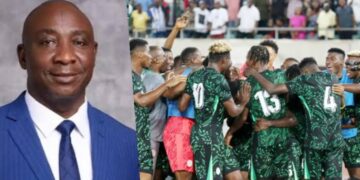A Senior Advocate of Nigeria, Theo Osanakpo, said, “What may be factually correct may be legally incorrect.’’
Some legal practitioners in Rivers on Thursday said the Presidential Election Petition Court‘s judgement upholding President Bola Tinubu’s victory was legal and did not act on the sentiments.
The lawyers spoke to journalists while reacting to the PEPC judgment, affirming Mr Tinubu and Vice President Kashim Shettima’s victory in the 2023 presidential election.
The five-man panel led by Justice Haruna Tsammani dismissed the petitions filed by the Allied Peoples Movement (APM), the Peoples Democratic Party (PDP) and the Labour Party (LP), and their respective candidates against Messrs Tinubu and Shettima.
Speaking, a Senior Advocate of Nigeria, Theo Osanakpo, said, “What may be factually correct may be legally incorrect.’’
He explained that cases were won by pleadings, which could be statements of claims or statements of defence, ‘’so what you put in is what you will adduce evidence to.
‘’Whoever that say I have 20 must have the evidence to show that you have 20; If they say that they have won, they would have been able to tender documents to prove it.
‘’The major challenge today is on the perceptions of the Nigerian public; they feel that judges are compromised, so it becomes difficult.
‘’In other words, the judiciary should put in its utmost best to regain the confidence of the people, making sure that they give justice judiciously and judicially,’’ he said.
Another legal practitioner, Don Loho, a legal practitioner, said the law was different from sentiments.
“When you look at the law, the judges are talking about the law, not fact, so that’s why you apply the law to situations; it is different from fact,” he said.
Mr Loho said the LP legal team did not do well, as they were making election matters like a class of their own.
“It is very technical; it is not just about talking; it’s about following the procedure,” he added.
He said they were talking about winning elections and having the majority of the votes without even talking about the votes, asking, ‘’how many votes did they have?’’
On the tribunal ruling on the 25 per cent vote in Abuja, Mr Loho said the Supreme Court had judged the matter long ago and did not give Abuja special considerations.
In her contribution, Onyinye Ileh, a Port Harcourt-based lawyer, said she was satisfied with the judgement as petitioners should have proved their cases before the court.
She maintained that the “judgement is based on the evidence in court; no matter what you say orally, you must back it up with strong evidence.
‘’And then, you check the section of the law that protects you on that issue.’’
Ms Ileh said election matters dealt with the figures collected from the polling units, the ward levels, local government collation centres, and finally, at the state levels to get the final results.
‘’On this, it was said that LP (Labour Party) did not do well; they did not call their agents as witnesses to give on-hand evidence but brought those who were not physically present at the units.
‘’You can’t allege that you were cheated when you don’t have figures to prove that you were cheated and could not prove it,’’ she said.





































This article had me hooked! For those curious, here’s more: DISCOVER MORE. What are your thoughts?